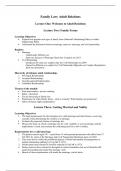Lecture notes
Family Law: Adult Relations Summary Notes
This is a compilation of lecture notes for the module Family Law: Adult Relations. It goes through the different areas from marriage, to divorce and other aspects. There are both notes from the lectures and the lecturer themselves as well as my own added notes.
[Show more]




